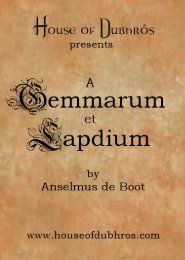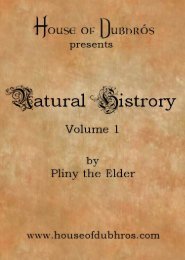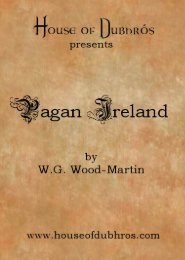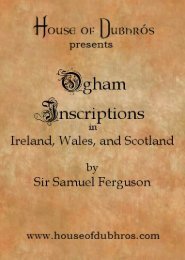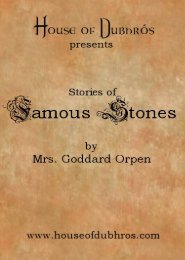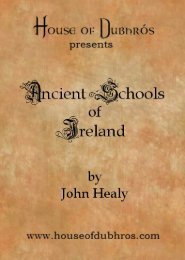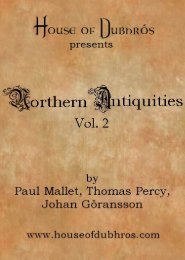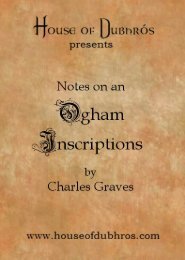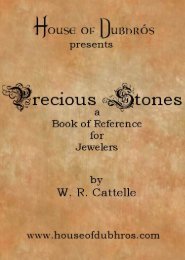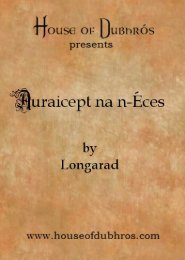You also want an ePaper? Increase the reach of your titles
YUMPU automatically turns print PDFs into web optimized ePapers that Google loves.
FINN<br />
Then cried the king young in war, "It is not dawn<br />
that glows in the east. There is no dragon flying here, nor<br />
are the gables <strong>of</strong> this hall aflame. But here they are hurry<br />
ing forth. The birds are singing, the grey-coat is howling,<br />
the war-wood is clanging, shield echoing when smitten by<br />
the shaft. Now shines the moon through rifts in the clouds ;<br />
now fearful deeds are afoot that will bring on a pitched battle<br />
here. But wake ye now, my warriors, don your corselets,<br />
think on your prowess, dash to the van, be <strong>of</strong> good courage."<br />
Schilling, however (M. L. N. i. HGff.) points out that no subject is required<br />
in A.S. where one is perfectly well understood; cf. Pogatscher, Anglia, xxin.<br />
261 ff. Moreover beraff is to be taken as intransitive.<br />
" But here they (the<br />
Frisians) are hurrying forth " ; cf. Elene, v. 45 :<br />
beran ut firtece<br />
rincas under roderum,<br />
and Andreas, v. 1220; also the mod. Eng. use <strong>of</strong> "bear" in nautical<br />
phrases.<br />
6, 7. There are several ways <strong>of</strong> taking this passage:<br />
(1) fugelas = " arrows," not elsewhere in A.S., gr&ghama = " mailcoat<br />
"; cf. Beowulf, v. 334, grsege syrcan, Andreas, v. 129, guffsearo gullon,<br />
" The arrows are whistling, the mail-coat is rattling."<br />
(2) fugelas = "birds <strong>of</strong> carrion," harbingers <strong>of</strong> slaughter, as <strong>of</strong>ten in<br />
A.S. poetry ; gr&ghama = "wolf" ; cf. Exeter Gnomic Verses, 151, wulf se<br />
grtega, Brunanburh, v. 64, etc.<br />
The latter rendering is more in character.<br />
8. pes, idiomatic usage; cf. Exodus, v. 430, J>eoa geomre lyft, etc.<br />
(Klaeber, Archiv f. n. S. cxv. 181).<br />
9. waffol; cf. perhaps MHG. wadel, "wandering," "erratic"; see<br />
Chambers, Beowulf, p. 159.<br />
10. folces niff in the sense <strong>of</strong> folcgefeoht, folcgewinn.<br />
12. Hickes, habbaff eowre landa, hie geaj> on ellen, emended to habbaff<br />
eowre hlencan, hicgeap on ellen on the analogy <strong>of</strong> Elene, v. 218: habban<br />
heora hlencan, hycgan on ellen; cf. Bugge, P.B.B. xn. 23.<br />
hicgeap on ellen; cf. Atlamal, XLVI,, hugj>i d harprajri and the Homeric<br />
13.<br />
5t 66vpidos dX/cTjs (Iliad, vi. 112).<br />
windaS on orde; cf. Genesis, v. 417:<br />
p&t he mid fefferhoman fleogan meahte<br />
windan on wolcne.<br />
The initial letter <strong>of</strong><br />
customary w <strong>of</strong> Hickes.<br />
windaff is slightly different in<br />
Hence Bieger (Z.f.d.A.<br />
form from the<br />
XLVIII. 9) and Klaeber<br />
(E. St. xxxix. 428) read J>inda9 = tumescere, " show your temper " ; the<br />
alliteration would then fall on orde, onmode. But cf. v. 27, wreccea (H.<br />
wrecten), where the identical form <strong>of</strong> w is found and initial J> is out <strong>of</strong> the<br />
question. Moreover Hickes represents capital p by even where >, the MBS.<br />
have/: cf. Metra <strong>of</strong> Boethius, iv. 11, 12 ff. in Thesaurus, i. 185 and Grein-<br />
Wiilker, m. 7 ft.<br />
D. R. P. 5



